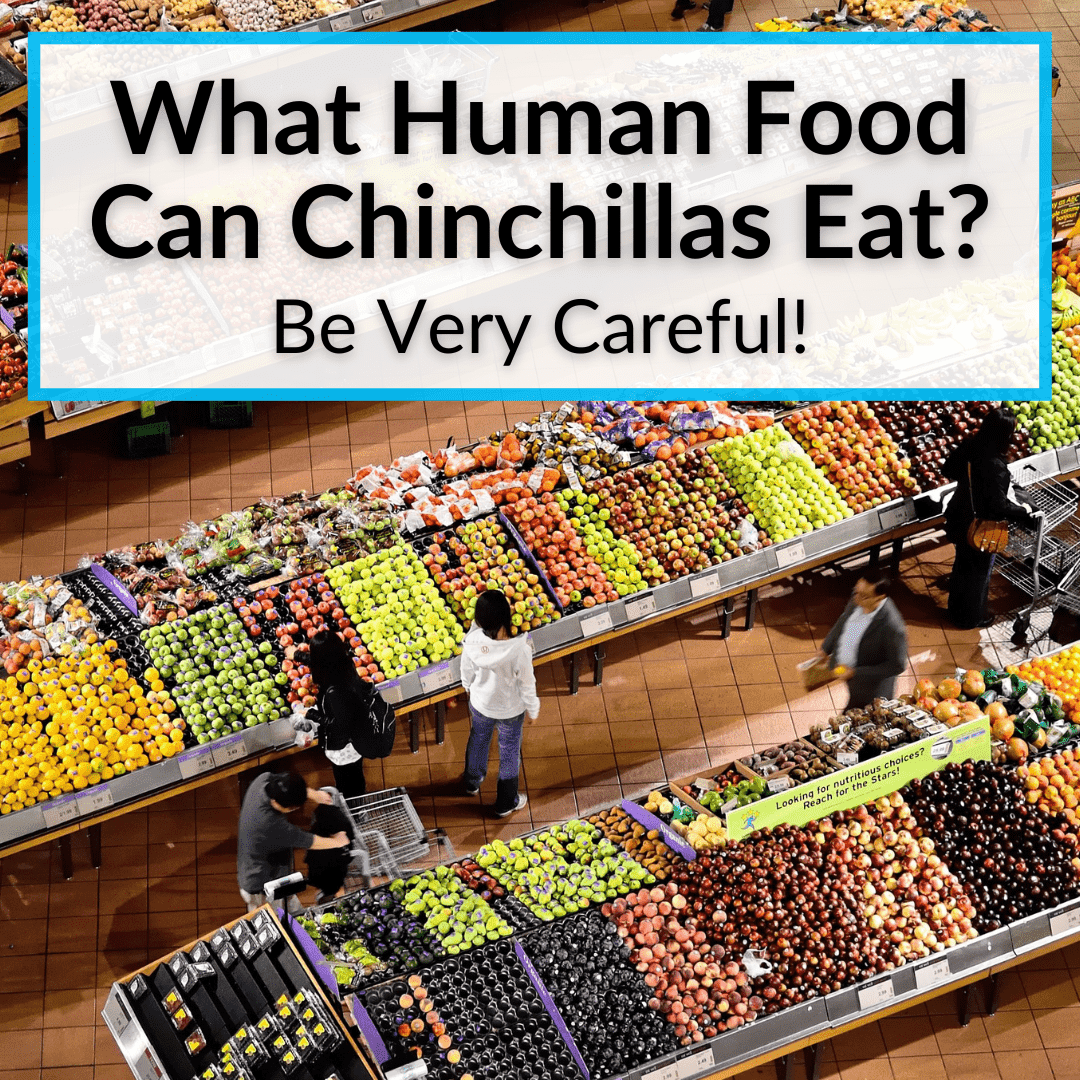
Even though much of that food isn’t especially good for them.
Can we do the same with chinchillas?
The answer is a resounding no!
Many of our foods would wreak havoc on the delicate digestive system of these tiny rodents.
What human food can chinchillas eat, if any?
They can eat some. The key is always to feed it is tiny amounts only.
Keep reading to learn what human food items your chinchilla can eat, and which ones you need to avoid altogether.
Contents
What Human Food Can Chinchillas Eat?
Chinchillas can eat a number of human foods, most notably vegetables, fruits, seeds, nuts and grains. That said, most of those items can cause trouble for their sensitive digestive systems, so you need to stick to tiny amounts only.
Chinchillas get all of the nutrition they need from hay and specially formulated pellets. Those can make up 100% of their diet.
Many owners like to give their pets additional treats. That is fine, but you should never make these treats more than 10% of their daily calories. And some food items are much better as treats than others.
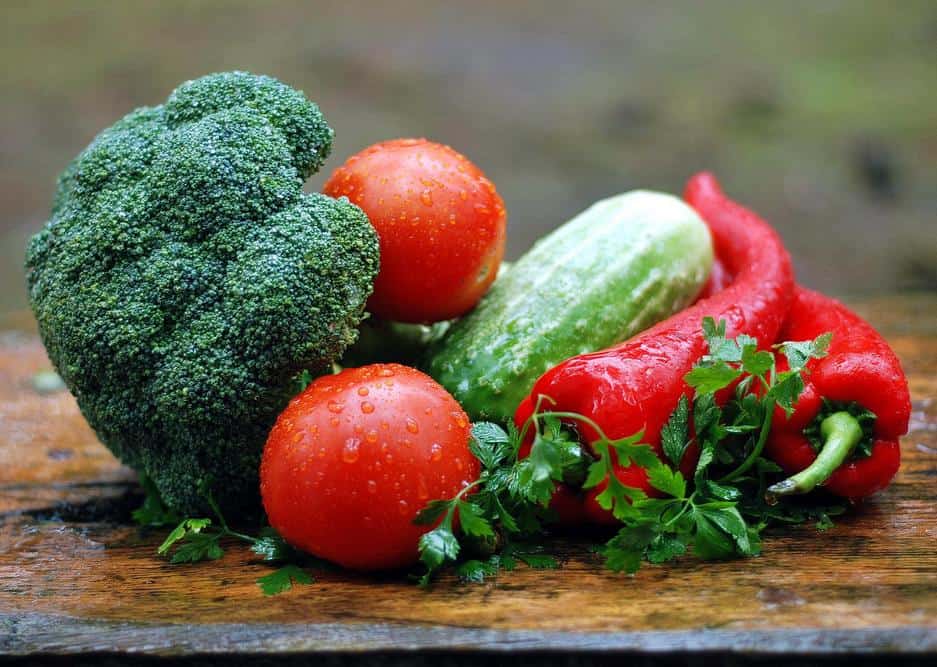
You’re probably wondering if there are certain items in your fridge that you can feed your little chinchilla. Even though some foods may seems perfectly safe, you need to careful about potential complications, whenever you feed your chin something new.
Let’s go through some of the human foods chinchillas can safely consume in small amounts, without worrying about negative health effects. To do so effectively, we need to first have a good understanding of a chinchilla’s diet.
Understanding The Chinchilla Diet
As prey, chinchillas are primarily herbivores. They do eat some animal protein in the wild, mainly eggs and insects. But the vast majority of their calories come from plants. That means they can consume some foods included in a typical human diet.
Of course, this is confined to the plant-based foods we typically eat. Unless you eat insects or small eggs.
However, what to feed a chinchilla in captivity is much simpler. The only foods pet chinchillas need to eat are Timothy hay and specially formulated chinchilla food pellets. Anything else you give your chin is unnecessary, though small treats are certainly appreciated.
If you do give your pet the occasional treat, you need to be careful what you feed it Giving your pet chinchilla the right foods is critical in determining its overall health. It can also determine how often you’ll have to take it to the vet.
It is important to understand that experimenting with a chinchilla’s diet could cause serious health problems. There are many things chinchillas can not eat. If you are ever not sure of something, it’s best to avoid giving it to your pet.
Or at least wait until you’ve had a chance to ask a proper medical professionals. Your veterinarian should be able to tell you if a certain food item is safe. We also have an article detailing what foods are poisonous to chinchillas.
That said, let’s go over some of the more common human foods you can feed to your chinchilla. Any of these food items are fine, as long as you feed them in moderation.
Remember, hay and pellets should make up at least 90% of your pet’s diet. And never leave your chinchilla without food.
Human Food Chinchillas Can Eat
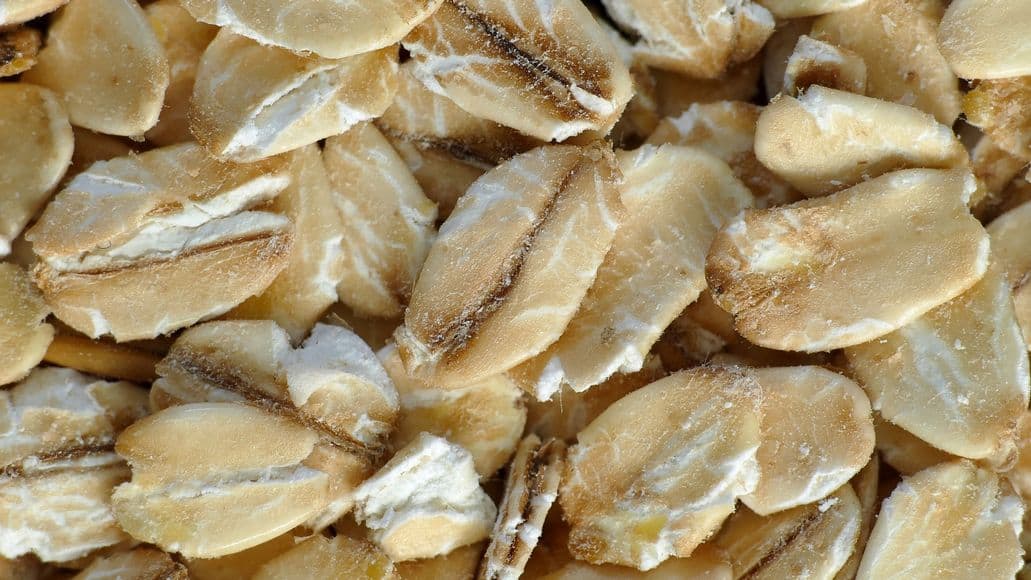
Here are the main human foods that you can feed your pet chinchilla. Again, none of these foods should form a large part of your pet’s diet. These should only ever be given as an occasional treat.
Fresh Vegetables
Vegetables and fruits make up a considerable portion of our diet. But before you try giving your pet whatever healthy food is on your plate, know that not all of them are suitable for your chinchilla.
Veterinary professionals have established that vegetables and fruits are food options we can give to our pet chinchillas, but some are healthier options than others.
Everything is good in moderation, and a key thing to understand is that you need to be very careful with the amounts when feeding your furry friend. Since vegetables contain sugars and sulfur, both of which are rough on a chinchilla’s digestive system, you need to ensure that you limit how much of these foods you give.
A few vegetables that can be good for your chinchilla in moderation are carrots, parsley, collard greens, kale, dandelion greens, turnip greens, and lettuce. Again, only give it a small amount of any vegetable, even vegetables chinchillas can have like carrots.
Vegetables with high water content, like lettuce, are always problematic. Can chinchillas eat lettuce then, or not? They can, but the high water content can cause bloating and diarrhea in chinchillas. A small amount is fine, but there are better treats to feed.
Can chinchillas have bell peppers or other similar vegetables? Bell peppers ae one of the better vegetables to feed chinchillas, but again, only in very small amounts and just once or twice a week.
Dried Fruits And Herbs
You can give your pet chinchilla dried herbs, fruits and vegetables. Dried fruits, vegetables, and herbs are good for your chinchilla because they contain less water.
Fresh herbs are fine, too, but you need to limit the amount due to the water content. But as long as you do that, they make for a great treat. Chinchillas can eat cilantro, thyme, and any other herb.
Let’s say you’re debating between what kind of grapes to feed your chinchilla: fresh or dried? It’s much safer to feed them dried ones instead of fresh ones. But you do need to remember that dried ones are much more dense. As always, small amounts only!
Raisins
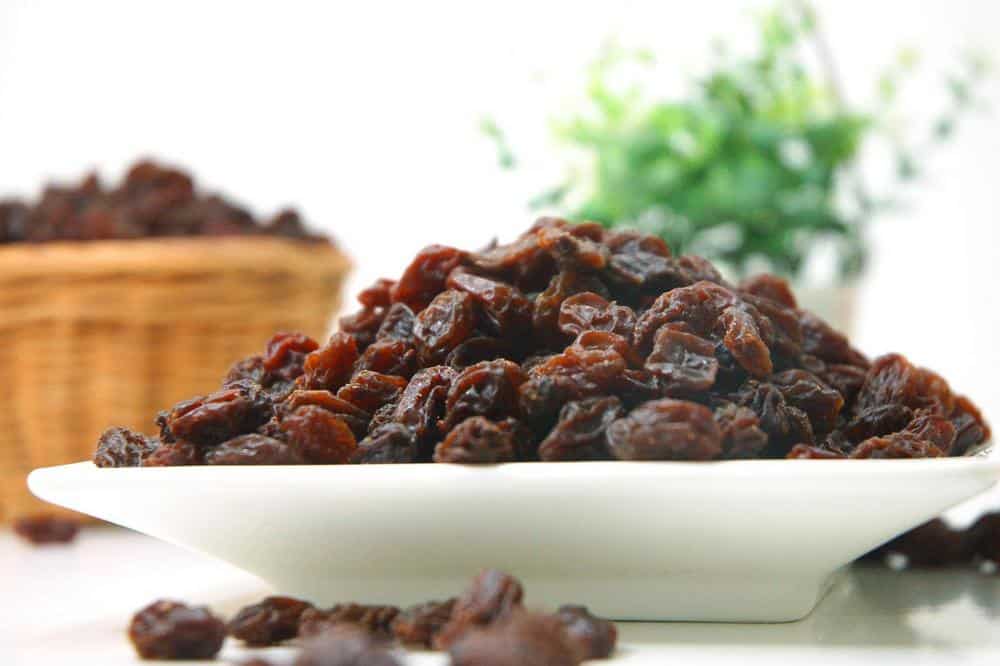
You can include raisins as a small part of your chinchilla’s diet. Chinchillas seem to enjoy eating raisins and consider it a treat.
You should, however, make sure that your pet isn’t eating too many raisins. Limit the amount you feed your chinchilla to 3 to 4 raisins a week. Anything beyond that amount could negatively affect its health, and you shouldn’t risk it.
Certain Breakfast Cereals
You’ll be surprised to hear that chinchillas can have certain types of breakfast cereals too. But there are very specific categories of cereals that are safe for these furry creatures to consume.
They can only eat cereals with natural ingredients. So nothing with any type of artificial ingredients. And certainly nothing with added sugar.
I realize that makes it hard to find a good breakfast cereal. Most of the ones sold in the US use preservatives and other chemicals to keep the cereal fresh, along with insane amounts of sugar to…I don’t even know what.
There is no good reason for all of the sugar. It is bad for us, but it can be devastating for your chinchilla.
It’s definitely not safe to feed your pet these kinds of breakfast cereals. Unless you’re sure about the ingredients in the cereal, it is best to refrain from feeding your chinchillas these kinds of foods altogether.
There are two main kinds of breakfast cereals to safely give your pet chinchilla.
Shredded wheat and cheerios are two different kinds of cereals that you can feed your chinchilla, because they mainly consist of natural ingredients like wheat, corn, and starch.
Corn flakes are another cereal chinchillas can eat. But again, provide any of these cereals only in moderation, because the ingredients can be a little heavy for your pet.
Can chinchillas have popcorn or similar snacks, if they are sugar-free? They can, but also in very small amounts. Popcorn has a lot of calories. It is better to stick to healthier snacks, like shredded wheat.
Can chinchillas have rice? They can, but it can cause them harm if you give more than a few grains and it does not really have any nutritional value for them. Best just to avoid rice altogether, despite it being the most consumed food on earth by us humans.
Dried Cranberry And Apple
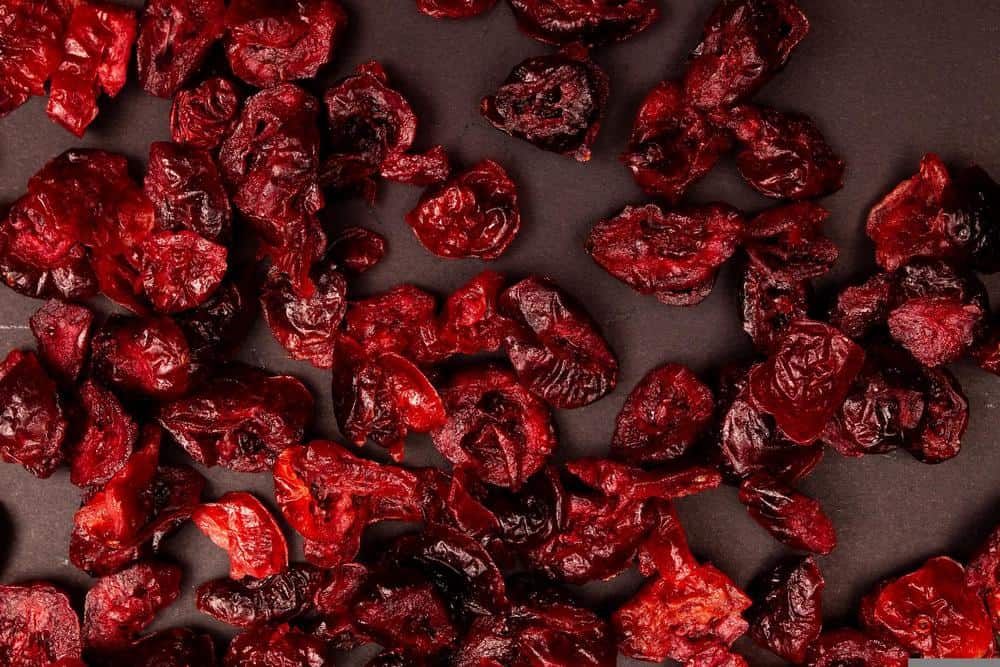
You can also feed your chinchilla dried cranberries and apples. Pet owners often feed these to their chinchillas as a treat. Don’t make the mistake of feeding them anything that isn’t dehydrated. Your pet can’t consume those.
Nuts and dried berries are delicious for these little rodents, but again, be sure to give them these treats in small quantities. Chinchillas can eat nuts and dried berries, but the high fat and sugar content respectively mean they can only eat very little of either.
When it comes to fruit, dried blueberries are a great choice, since they are rich in antioxidants. Can chinchillas eat blueberries if they are fresh? A tiny amount is fine, but it’s best to just avoid them altogether.
Perhaps the best of all are goji berries. Not only can chinchillas eat goji berries, but they are probably the best fruit of all, because they have less sugar. But stick to dried goji berries.
No Sudden Dietary Changes
One thing to understand about your pet chinchilla is that it does not do well with sudden dietary changes. Whenever you’re introducing a new food, do so slowly over several days. Other than that, make sure to consistently provide a steady diet.
When dealing with an animal with a sensitive digestive system like a chinchilla, you should carefully record any changes in their health patterns, along with any and all dietary changes. That way you can always see how your pet is reacting to the diet you give it.
Human Foods For Chinchillas: Final Thoughts
Chinchillas can eat a number of human foods, but only in small quantities. And the key is always unprocessed and natural ingredients only. While chinchillas in the wild occasionally eat animal protein (usually insects and eggs), you should not feed your chin any animal products in captivity.
Stick to small amounts of vegetables, dried fruits, nuts, seeds or grains. Some flowers are good, too, like hibiscus. Can chinchillas eat hibiscus flowers when they are fresh? They can, but dried is better. And easier.
If you are searching for other good treats to feed your chinchilla, you can feet it oats. Rose hips are also good chinchilla snacks.
Leave a Reply